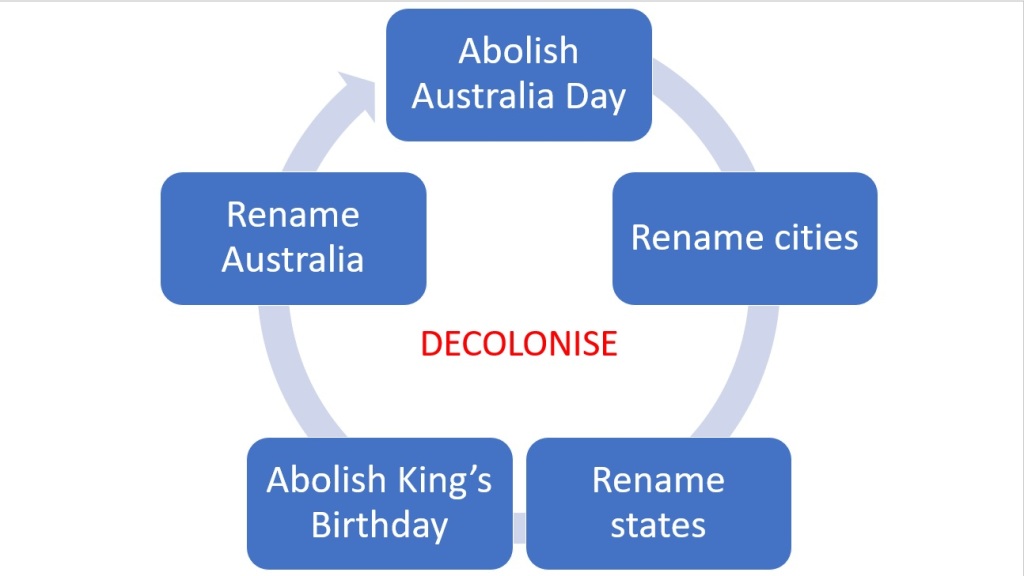There’s an old saying that rings true when I think about the annual Australia Day debate: ‘give them an inch and they will take a mile.’
Year upon year Australia endures its annual Groundhog Day of activist guilt tripping and grievance mongering. Shrill screams of ‘Invasion Day’ and ‘No Pride in Genocide’ pollute the streets while regular people simply wish to take stock and be grateful for living here and not somewhere else.
Here, where health and education is subsidised, unemployment is low, utilities are reliable and civic order is relatively (by comparison) stable. Here, where colonisation gifted us the institutions that nurture our liberal economic market and democracy.
But the point of this post is not to point out how grateful we should be. That much is obvious for anyone who cares to take a look around the world right now. The point of this post is to warn against those who may be tempted to believe that all the activists really want is a simple change of the date in order to be more inclusive. This is what they sell, but it is not their endgame.
If, like me, you work in academic circles and have had the displeasure of encountering the word ‘decolonise’, you will know exactly what I am talking about. The effort to change the date of Australia Day is only one front in an ongoing campaign to ‘decolonise’ Australia.
What is decolonisation?
Commonly understood, decolonisation involves identifying colonial systems, structures and relationships, and working to challenge those systems.
It needs to be understood that, according to the left, Australia is the product of a colonial system that entrenches racism and therefore the entire colonial project needs to be dismantled. This stretches from dates of national significance, names of streets and towns, to entire systems of governance. The campaign to decolonise means chipping away at the core pillars this society is built on: private property rights, liberal democracy, capitalism, the free market, constitutional law. All are fair game and ripe for challenge.
So, while some may sympathise with arguments calling for a more inclusive date for our national day, it is important to remain steadfastly committed to January 26 simply to maintain the principle of refusing to give way to wider efforts to reimagine this country according to the ideology of people intent on dismantling everything that has made it thrive.
Seem extreme or paranoid? Simply look for yourself. Here is a video from Sovereign Union calling for the renaming of statues and towns.
Or you can read from creativespirits.info to find out more about what decolonisation means.
If, dear reader, you are already entrenched in Australia’s university system, such a campaign comes as no surprise since it is now an article of faith amongst most academics intent on seeing this exercise through to its conclusion.
Have you noticed how ABC reporters now don’t report from Sydney but from Gadigal Country? The increasing trend of leftists on social media to remove Melbourne from their posted place of residence and replace it with Naarm or ‘living on Wurundjeri land’, as if they’re grateful to be extended the privilege of an invitation.
A successful campaign to change the date of Australia Day will only grant encouragement for the left to challenge the next source of cultural grievance they set their sights on.
The state names of Sydney, Melbourne, Brisbane will be ‘culturally unsafe’ since they are named after a British Lord, Prime Minister and Major General. Victoria will be ‘offensive’ given it commemorates a woman who oversaw the process of colonisation. The very name of the country, Australia, will inevitably be rejected as a colonial title that is problematic and requiring change. Think I’m exaggerating, look only to our neighbours, New Zealand, or should we say ‘Aotearoa’, its Maori name. Witness here this article from The Guardian speculating on the potential for the country’s name to change.

Yet removing statues and changing titles is small change compared to efforts to decolonise Australia’s legal system. We are already seeing evidence of this via Victoria’s First Nations Peoples Assembly calling for separate systems of justice for Indigenous youths.
We have already seen attempts to change the constitution via the campaign for a First Nations Voice to Parliament. Much as it was sold as a modest change, it was the first pillar in a three step process: Voice, Treaty, Truth. Australians, wisely, cut the campaign off at the start.
Such it must be with Australia Day. The effort to decolonise the country starts with small acts of symbolism, chipping away at the nation’s fabric to reinvent it in the eyes of activists who despise the core tenets of western civilisation.
Stop it at the start.

Leave a comment